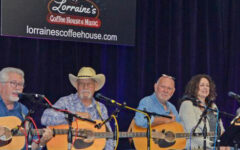This post is part of our occasional feature, Songwriter Profiles. If you have a suggestion for a bluegrass songwriter we might want to consider, please contact us.
 What do Money in the Bank, Union Man, Snapshots and Souvenirs and Always Never Enough have in common? All of these songs, recorded by Lonesome River Band, Blue Highway, Mountain Heart and the Kenny and Amanda Smith Band were written or co-written by Tim Stafford, one of the creative forces in Blue Highway, one of the most popular of the modern-day bluegrass bands. Stafford’s songs have also been recorded by Larry Sparks, Dan Tyminski, Ronnie Bowman, Claire Lynch and Alecia Nugent.
What do Money in the Bank, Union Man, Snapshots and Souvenirs and Always Never Enough have in common? All of these songs, recorded by Lonesome River Band, Blue Highway, Mountain Heart and the Kenny and Amanda Smith Band were written or co-written by Tim Stafford, one of the creative forces in Blue Highway, one of the most popular of the modern-day bluegrass bands. Stafford’s songs have also been recorded by Larry Sparks, Dan Tyminski, Ronnie Bowman, Claire Lynch and Alecia Nugent.
A native of Kingsport, Tennessee, where he currently resides, Tim Stafford began playing guitar seriously at the age of 18. As a teenager, he played with various groups in the Tri-Cities area of East Tennessee, including Mountain Memories and the Boys in the Band.
Subsequently, he helped to found the band Dusty Miller, which was named SPBGMA International Bluegrass Band champions in 1990. Later that same year Stafford joined Alison Krauss and Union Station, along with Adam Steffey and Barry Bales. The band was named IBMA Entertainer of the Year in 1991.
Although he left Union Station in May 1992, in order to spend more time with his son Daniel, who was born in January of that year, Stafford won a Grammy award in January 1993 for his work on Every Time You Say Goodbye (Rounder, 1992).
In 1994, he organized his present band Blue Highway. They have released eight albums, the latest of which includes the award-winning title-song Through The Window Of A Train, written by Tim Stafford and Steve Gulley. Like this CD, all the other Blue Highway projects feature material written by Stafford.
In 2004 he released a highly acclaimed solo album Endless Line (FGM Records 114). This CD has nine songs penned by Stafford himself.
Recently, I spoke to Tim Stafford about his song writing skills ……
When did you start writing songs and what was the impulse?
I started writing when I was very young. I can’t really say what the impulse was. My sisters were piano players, and they always had written music laying around. I would look at Beatles and Simon and Garfunkel songbooks and try to figure out the songs and pretty soon I was coming up with stuff of my own. I wrote some not long after I picked up guitar–nothing I’d be willing for anyone to hear — and all the way up until I joined Blue Highway I was writing. But when that band started, I felt a conscious need to write more — Wayne Taylor had written some good things and he kind of inspired me to start taking it more seriously.
From whom have you learned most about the art of song writing?
I’ve studied it, bought books, listened to as many good songwriters as I could, but I still believe it’s a completely subjective thing. I’ve learned a lot from everyone I’ve written with. Kim Williams has a great ear for phrases. Bobby Starnes is always thinking. Steve Gulley and I have a good chemistry. Other writers I admire include Carter Stanley, Ira Louvin, Jimmy Webb, James Taylor, Harley Allen, Paul McCartney, John Lennon, Darrell Scott, Tim O’Brien, Gordon Lightfoot, Bob Dylan, Merle Haggard, Billy Joel, Hank Williams, Hazel Dickens, Burt Bacharach, Paul Williams… There are so many great writers.
How many songs have you written and how many of them have been recorded?
Probably around 200, and I’d say around 100 have been recorded.
Can you share some of the techniques that you use in your song writing?
I try to find a great idea anywhere I can — conversations, TV, newspapers, magazines, movies and I keep a ‘hook book’ to make sure that I don’t lose ideas. I’m always writing them down on business cards or saying them into a digital recorder. When I start writing or co-writing, I try to feel what a particular idea should sound like without thinking about it too much and then have the recorder running… Usually the first idea is best. But the key is making the melody match the lyric.
You have co-written songs with Dan Tyminski, Ronnie Bowman and Steve Gulley, among others; what different approach(es) have to be employed when writing with others?
Everybody’s different. When you co-write, you have to be aware of that and tailor your approach to whatever the situation is. I’m usually a melody guy, but you never know what direction something’s going to take, or who will have a melodic hook that works. You have to be receptive and malleable at the same time you’re strong and decisive. Does that make sense?
Is there any song that you have written behind which there is an interesting story?
Lots of them — that’s what makes them good ideas to begin with usually. A Week From Today, for example, came from a story my preacher told me — about a fellow who had been in prison for years and was scheduled to get out but didn’t want to go. Some time after Bobby Starnes and I wrote it, I saw Shawshank Redemption, and everybody assumes it came from that, but it didn’t. Two Soldiers came from a story on CNN about a soldier who wrote a letter that made it home, although he didn’t — he said, ‘If you see two soldiers at your door, you’ll know I’m in Heaven.’
Through the Window of a Train is the 2008 IBMA Song of the Year; what other songs have won you accolades from your peers/fans?
You mean awards? That’s the first song I’ve written or co-written that’s won an award, I guess. It’s always gratifying when anyone comes up to you and says a song you wrote made a difference in some way in their life or spoke to them. Some Day I guess has made the most impact in that way, even though I only wrote the melody for it. A lot of people tell me they identify with Midwestern Town, which is a truly fictional song. Ronnie Bowman did a great job on that one. Pacific Time, Union Man, How Long is This Train, Think About You Every Day, Two Soldiers, Wild Bill, Rider on an Endless Line… People are so nice to come up at shows and tell me they like songs. Its makes you feel like you’re doing something good.
Which of all the songs that you have written gives you most satisfaction and why?
Actually, it’s immensely satisfying when anyone cuts one of your songs–I’m sure every songwriter can relate to the feeling you get when you hear someone else’s version of it for the first time. I can’t really take credit for Some Day, but it does give me a lot of satisfaction that people seem to have been genuinely comforted by it at a very difficult time in their lives. One of my favorites is one Steve Gulley and I have co-written, Just Another Setting Sun, and one Bobby Starnes and I co-wrote about our high school years called Back in the Day. Another recent favourite is The Last Greyhound that Alecia Nugent and April Verch recorded — Craig Market and I co-wrote that one. Darrell Scott and I recently wrote a very dark piece about clinical depression, called Bleeding for a Little Peace of Mind. I really like that one. Darrell is amazing.
Of the songs of yours that have been recorded most have been recorded by Blue Highway; apart from the demand for songs for your recording sessions, have you been commissioned by others to write a song for them?
Well, actually, I think I’ve had more songs cut by other people now. When Blue Highway first started, I felt a need to write material for the group, and they’ve recorded a lot of them. But I have been really fortunate that other folks ask me for material as well. I may not have exactly what they’re looking for, but it’s great of them to ask!
How do you combine the process of song writing with being part of a touring band?
We used to write a lot while we were out on the road, but we just don’t do that much anymore. As you get older, you tend to want time to yourself out on the road. I would like to co-write more with these boys though — I think Shawn [Lane] and Wayne [Taylor] are great writers.
What tips would you give to an aspiring young bluegrass writer?
I don’t know if it’s something you can learn how to do, but you can get better at it. Just write as much as you can with different people and by yourself. Be critical of your songs — how can you make them better? Always look for ideas, and always write them down or keep a list of them somewhere. Then get out there and play your songs for people, but make sure they’re copyright protected [www.copyright.gov]. Make good demos and give them to artists you think might cut them — we have that luxury in the bluegrass business. You can walk right up to an artist and hand them a CD. Get a tough skin though, because they may not have time to listen to everything and you need to get used to rejection. It’s all part of the process.







